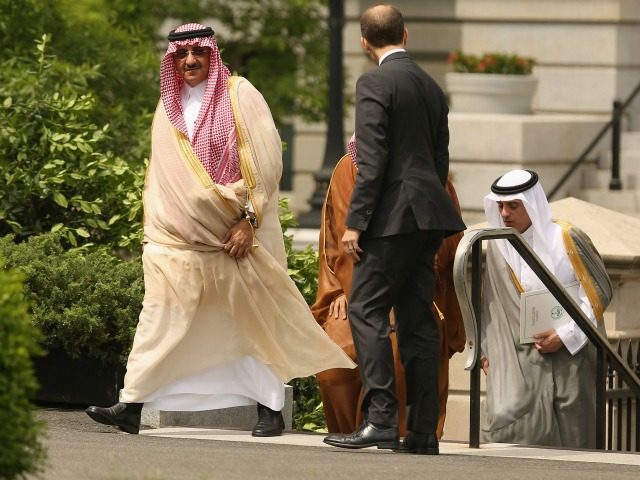Astroturf politics is when a group pays an organization or K Street lobbying firm to send calls, letters, emails, and people to town hall meetings to pressure members to vote in a certain manner. The goal is to present the appearance of a spontaneous movement and to have people communicating with a member of Congress on an issue in a way that makes it appear to be a popular movement. But these individuals are frauds, and they are being paid to fool senators or representatives.
Right now, a foreign power is using the tactics of the astroturf to pressure Congress into supporting a bill that will drastically change existing law, stopping 9/11 victims from having a day in court in an attempt to prove that the Kingdom of Saudi Arabia played a role in the 9/11 attacks. The law, the Justice Against Sponsors of Terrorism Act (JASTA), had the strong and overwhelming support of Congress when passed late last year over a veto by President Obama. Thankfully, President Donald Trump supports the law and is on record as supporting the idea that Americans who lost family members and were injured on 9/11 deserve an opportunity to find out the truth.
Eric Owens of the Daily Caller reported on February 7, 2017, that the Kingdom of Saudi Arabia is paying a large public relations firm to recruit American military veterans to oppose a law that allows the families of 9/11 victims to sue in the federal courts:
Saudi Arabia is paying Qorvis MSLGROUP, “one of the largest public relations firms in the world,” to lobby for the McCain-Graham amendment.
Qorvis is the primary registrant for two consultants — and possibly more — who are working in different parts of the country to recruit veterans to oppose JASTA in the halls of Congress.
According to media reports, Saudi Arabia spread large amounts of cash up and down K Street in Washington, D.C. to hire an army of lobbyists and public relations firms to stop the JASTA law from passing last year.
According to a story from The Hill published on November 2, 2016:
There are now 14 shops working for the country overall, including heavyweights like Podesta Group, BGR Group, Brownstein Hyatt Farber Schreck, King & Spalding and Squire Patton Boggs.
The latest disclosure forms, which were filed last week but just appeared in the Justice Department foreign lobbying database, show that Saudi Arabia’s advocacy strategy is expanding beyond the Beltway.
That effort is continuing into this year and the Kingdom of Saudi Arabia is expected to spend millions on lobbying and astroturf public relations to pass an amendment to the law drafted up by Sens. Lindsey Graham (R-SC), John McCain (R-AZ) and supported by Sen. Orrin Hatch (R-UT), which would put in place procedures that would thwart a full and fair trial on the merits of the pending case. These members are, wittingly or unwittingly, doing the bidding of a foreign power.
I worked for Sen. Bob Smith (R-NH) and worked to help pass legislation that allowed the victims of state sponsors of terrorism to have a day in court. In 1996, a law was passed that amended the Foreign Sovereign Immunities Act (FSIA) that allowed U.S. victims of terrorism to go into court and sue foreign nations listed as State sponsors of terrorism. In 2002, Congress passed a law that allowed blocked assets from those State sponsors of terrorism to be used to satisfy judgments.
One of the most prominent cases that came out of that law was the suit by the American hostages in the 1979 hostage crisis, a foreign policy nightmare that gripped the nation and became a big political issue during President Jimmy Carter’s race against Ronald Reagan in 1980. In the case Flatow v. Islamic Republic of Iran, the victims tried to seize assets by attaching diplomatic properties in the United States, which lead to a change in the law allowing for seized assets to be used to pay victims. There were cases that involved Americans who were held as human shields in the first Iraq war by the Saddam Hussein regime, a case that attempted to resolve the bombing of a plane sponsored by an individual working on behalf of the Libyan government that killed a number of American students travelling to Europe, and another case involving victims of Cuban terrorism. These past instances demonstrate how it is not unusual for American citizens to sue foreign governments for egregious wrongdoings.
Over the years, our law has moved away from the idea of foreign sovereign immunity — that “The King Can Do No Wrong” — because when a foreign government commits an act of terrorism and kills American citizens, that idea is waived and hurts domestic victims, foreign relations, and international law.
The firms who are accepting money to fight on the wrong side of this issue really need to take a hard look in the mirror to see if they feel good about opposing the rights of American citizens to have a day in court. And they should feel dirty for taking foreign money to hide the facts in a case that may prove that elements of the Saudi Arabian government helped out the killers who attacked America on 9/11.
Brian Darling is former Counsel and Sr. Communications Director for Sen. Rand Paul (R-KY). Darling is also a former Sr. Fellow for Government Studies at The Heritage Foundation. He can be followed on Twitter @BrianHDarling

COMMENTS
Please let us know if you're having issues with commenting.